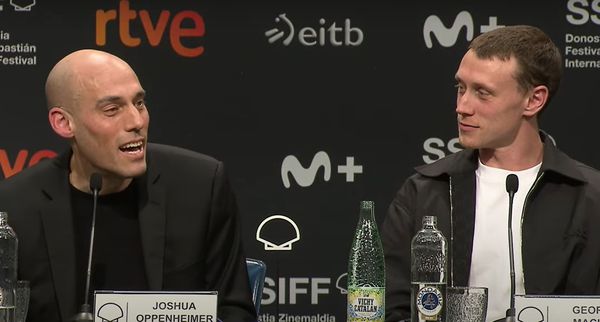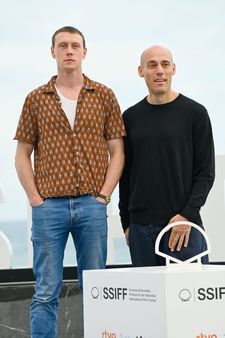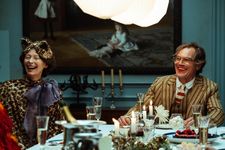 |
| Joshua Oppenheimer and George Mackay during the press conference |
The film had its international premiere at San Sebastian Film Festival after playing Telluride and Toronto. Oppenheimer attended a press conference along with Mackay and noted that the film is a reflection of the modern world.
“We live in a society, we live in an economy that tells us we should be greedy,” Oppenheimer said.
 |
| George Mackay and Joshua Oppenheimer in San Sebastian Photo: Gari Garaialde/Courtesy San Sebastian Film Festival |
He adds: “When we place all our hopes on a notion of family, it's defined through the exclusion of the rest of the human family. We define ourselves and our communities through the countries we're from to the exclusion of people across borders, whom we knowingly, immiserate and, at the same time, depend on to clothe us, to produce our food, to mine the rare metals in our mobile phones. We exclude them and we block them out from our consciousness. We place ourselves willingly, habitually each and every day in a bunker just like the family's bunker. And I think this film is set in the future but it’s about our present.”
The director says the musical aspect became the “route to understanding the character”. He adds: “The characters sing their hopes, they sing their delusions, they sing their lies. They sing the stories that they tell themselves, so that they can cope with their situation. And it was crucial to me that those lies and hopes and delusions be beautiful, and seductive so that when we hear them, we're humming along with them and in a sense slipping into their skin and swept up into the beauty of the lie with them and that meant we should be able to forget that we're in a bunker, we shouldn't feel we're in a claustrophobic concrete box like in a film like Downfall.”
Referencing the “bouncy, buoyant forward-looking” Golden Age musicals, the director adds: “Maybe they should be called the Dark Age musicals because they were being produced pretty much in unique moment in human history when we developed the ability to annihilate ourselves at the push of a button in the 1940s and 50s. So, That's when all this optimism sung forth in these soaring strings and woodwinds.
“In those Golden Age Broadway musicals it’s a sort of cliche but there's truth to it that the characters burst into song when they have a truth that's so passionate and so forceful it can't be contained in dialogue and I think The End is almost the negative image of that in the sense that the songs emerge from crises of doubt.”
He says when the characters’ stories that they tell themselves start to unravel “they burst ito song. Their lies and stories are splintered like a shipwreck and they're grasping for the fragments of the broken boat, trying to put together a life raft.”
He adds: “Unlike in a Golden Age musical, where the songs hold the truth ,it's the silence that holds the truth.”
 |
| Tilda Swinton and Michael Shannon in The End Photo: Courtesy of San Sebastian Film Festival/Jorge Fuembuena |
He adds that his character is one of “extremity” that “offered up fertile ground for an expressive performance.
Oppenheimer adds that the film had to be a musical. He says: “If it were not a musical, it would be a bleak and scary science-fiction story about a family trapped in a bunker trying to survive alone after the world has ended. The fact that it's a musical is what makes it a film about delusion and denial and storytelling. So I think if you were to hide that aspect of the film it would backfire profoundly because the audience would come into the film expecting something utterly different than what they get. What we always try to do is to make form and content inform each other completely or as completely as we can.”
The End is competing in the Official Selection at San Sebastian, with the winners announced at the weekend. It will be released by Neon in the US on December 6.





















